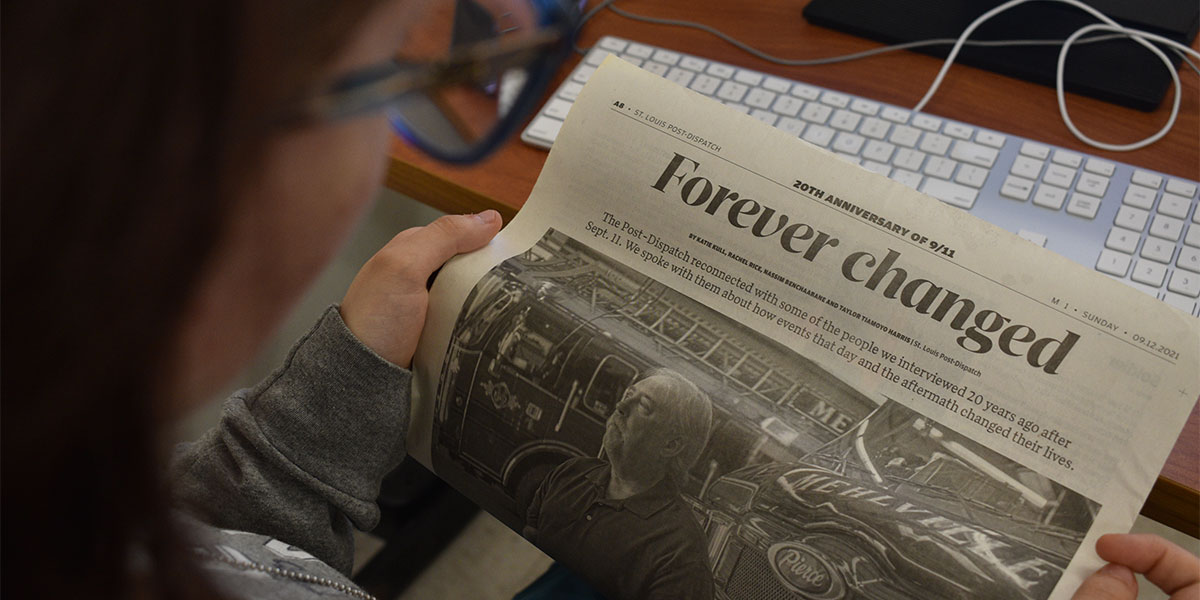Physical newspapers are dying out and “cell phone journalism” is becoming more popular. However, true journalism is still as important as ever. Nowadays, people are truly blessed with a wealth of timely factual information, yet not everyone appreciates it for what it is.
 Allie Pruett, a journalism major, reads a traditional printed newspaper. In the last two years, since the pandemic, physical circulation of papers has fallen to a third of its pre-pandemic circulation with some organizations losing as much as 26%, according to the Press Gazette. Meanwhile, news websites, such as The New York Times’ site, have increased up to 55% with 458.7 million in July of 2022. Photo by Morgan Kromer
Allie Pruett, a journalism major, reads a traditional printed newspaper. In the last two years, since the pandemic, physical circulation of papers has fallen to a third of its pre-pandemic circulation with some organizations losing as much as 26%, according to the Press Gazette. Meanwhile, news websites, such as The New York Times’ site, have increased up to 55% with 458.7 million in July of 2022. Photo by Morgan Kromer
__________________________________________________
Thinking back to the days before professional news services, the Founding Fathers’ news took weeks to go from one city or state to another in letter format.
They worked to advance that system, and with advancements in technology, it has continued to be renovated into what it is today.
If a war starts, most of the world knows in a click; think of how fortunate that makes us.
The news industry is often ridiculed, criticized or ignored completely; a 2021 Reuters Media Trust survey explained the United States ranked last out of 46 countries at 29% of 92,000 surveyed consumers trusting their sources, while Finland led at 65%.
Yes, there are some outlets and individuals who take advantage of their information-sharing status in what consumers (and researchers) call agenda-setting and gatekeeping, which is the ability to influence and manipulate what is at the forefront of news topics, an important role of mass media but one that can also be abused.
However, on the whole, the news makes the world run how it currently does.
Kelli Jones, Missouri Governor Mike Parson’s communications director, spoke on the importance of truth in journalism at the recent Pathway Journalism Retreat in Jefferson City, Missouri.
Jones said true journalists “are an essential ingredient to the functions of our democracy. Freedom of the press matters because a free press uncovers the truth. Without you [journalists], truth often remains buried. Free press holds institutions/people accountable – where they would otherwise go unchecked.”
Not only do we learn the truth about the current happenings in the country and the world, but also in our own cities and states.
Some of the most important elections, the ones in which we can make the most difference the quickest, are local elections.
That’s why they say it is your civic duty to vote, because it is.
But one only knows who they want to vote for and can make their own decision when the straight facts are presented to them.
While their tangible newspapers reach about two million readers in the Greater St. Louis Area each month, the Post-Dispatch’s monthly online circulation records 41 million pageviews in that same amount of time (including the Post-Dispatch, Feast Magazine and the Ladue News), spanning across the entire country.
The only way we as journalists can reach that many people is through such a medium as the internet.
The only ones who have the possibility of sharing unbiased information to the masses are journalists.
Nowadays, with so much high-definition mobile technology, they say anyone can be a journalist.
Much of that is shared through social media platforms such as Facebook, Instagram and Twitter.
But much of what comes with the so-called “civilian reporter’s” content is not unbiased in any way, and rarely completely factual.
To the “civilian with the iPhone’s” defense, they are not trained as journalists and are therefore not tied to a journalistic ethical standard.
In other words, they do not have to be objective. They are the public.
However, professional journalists, who cover the topics of the day and should be stating only facts, do their work with the clear intention of letting consumers form their own opinions.
That is good journalism, and that is why professional news reporting is important.
If consumers do not stay informed by these unbiased sources, they are not even truly forming their own opinions.
Yes, paper news is dying out, but the future of professional information sharing is just beginning.